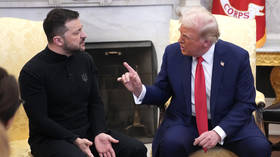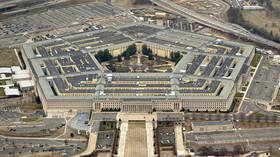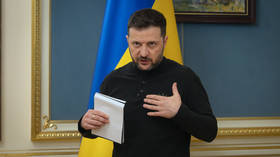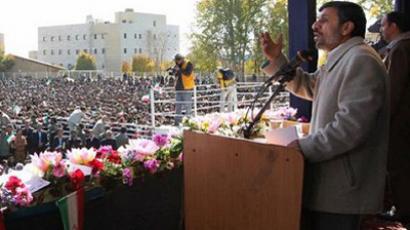Nuke rumble: Press the Persians, or else…
While media sources warn that Israel’s attack on Iran’s nuclear sites is imminent, US officials says sanctions would be just as effective as bombs in stopping Iran from building nuclear arms. Other say sanctions are no solution either.
An attack on Iranian nuclear facilities would not achieve the goal of halting its nuclear program, but could instead have “unintended consequences”, believes US Defense Secretary Leon Panetta.The head of the Pentagon told RTT news on Thursday that he personally preferred the use of "the toughest sanctions – economic, diplomatic pressures – on Iran to change their behavior."A similar statement came from State Department spokesman Mark Toner, who said the US is consulting with international allies over what the next steps should be.“Certainly we’re going to look at ways that we can ramp up economic pressure on Iran,” he said on Thursday at a media conference.Earlier, a number of countries and the European Union said they favored a new round of sanctions against Tehran as the way of applying more leverage and forcing Iran into allaying international concerns over its nuclear program.However Russia and China, two permanent members of the UN Security Council, who can veto any draft resolution of the international security body, say further sanctions will not solve the ongoing dispute.“We believe that the sanctions component in the framework of the Iranian nuclear program has long become obsolete,” spokesman for the Russian Foreign Minister, Aleksandr Lukashevich, said on Thursday.Last year’s Resolution 1929 is tough enough “to show the Iranian leadership that the international community expects concrete and sensible steps to making its nuclear research transparent,” he said, adding that “there is neither a military nor an isolationist way” to solve the problem. The Russian view is shared by China, which says frank exchanges rather than coercion is the best way to convince Iran to co-operate with UN nuclear inspectors.“Dialogue and co-operation is the most effective way to resolve the Iranian nuclear issue. Sanctions and pressure cannot fundamentally solve the issue,” Chinese Foreign Ministry spokesman Hong Lei said Friday as cited by AP.Meanwhile, Israel is maintaining its hardline stance on Iran’s alleged intention to develop nuclear weapons.On Wednesday, Uzi Landau, Israel's minister of national infrastructure, compared the way the European leadership treats Iran now to the “appeasement policy” toward the Nazi Germany in the 1930s.Iran’s military build-up threatens Europe and will eventually threaten the US as it is threatening Israel now, he told the Washington Times newspaper."They have already now developed ballistic missiles with a range much larger than Israel, to get to Europe, and they will get to the United States, too. A country like Iran doesn't put its limited resource into developing those things that they aren't going to use," the Israeli official warned.But Israel itself could never attack Iran or inflict damage that would be lasting, believes Professor Muhammad Sahimi, a professor of Chemical Engineering and Materials Science at the University of Southern California.“What Israel could do is a one-day bomb a few places, but nothing beyond that. That would bring fierce retaliation by the Iranian forces. In addition to Iran being capable to attack Israel itself, Tehran has allies across the region: Iraq, Lebanon or Palestine. That would create significant problems for Tel-Aviv,” Professor Sahimi told RT. Meanwhile Tehran has already warned of dire consequences if any military action is taken against it.The threats of an Israeli attack on Iran are most likely empty, but “if it happens, they will risk not just their legitimacy, but their existence,” Ali Bagheri, Deputy Secretary of Iran's Supreme National Security Council, said on Wednesday.He added that the report by the International Atomic Energy Agency, which alleged that Iran’s nuclear program may have military goals, would have the effect of torpedoing the Russian-sponsored roadmap aimed at resolving the conflict.The initiative, which has so far failed to gain the support of the other parties in the six-member mediators’ group, is a step-by-step plan of mutual concessions to defuse the tension. Russia still hopes that the permanent members of the UN Security Council and Germany, which constitute the group, will reconsider the plan, the Russian Foreign Ministry said on Thursday.














